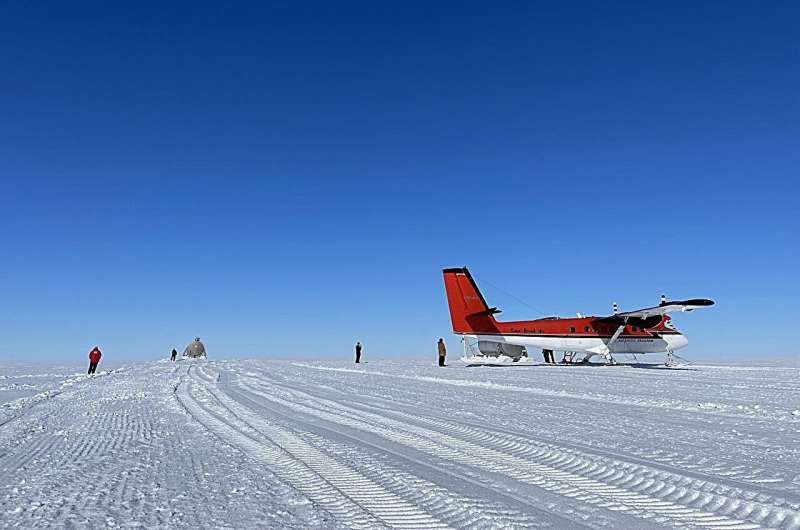This article has been reviewed according to Science X's editorial process and policies. Editors have highlighted the following attributes while ensuring the content's credibility:
fact-checked
peer-reviewed publication
trusted source
proofread
Antarctic cold spells shatter records amid global heat waves in late winter 2023

While 2023 is noted for breaking global temperature records (State of the Global Climate 2023), the year also brought an unexpected twist with extreme cold events in Antarctica. A new study published in Advances in Atmospheric Sciences reveals the surprising and severe cold spells that struck the continent in late winter (July and August).
In a detailed examination of the late winter months of 2023, researchers observed extreme cold temperatures across a broad region of Antarctica.
"Record cold temperatures were observed in our Automatic Weather Stations (AWS) network as well as other locations around the region," said Matthew A. Lazzara of the Antarctic Meteorological Research and Data Center at the University of Wisconsin-Madison (UW-Madison).
"These phases were marked by new record low temperatures recorded at both staffed and automatic weather stations, spanning East Antarctica, the Ross Ice Shelf, and West Antarctica to the Antarctic Peninsula."
"The highest point, Kunlun Station, recorded its lowest temperature ever observed at -79.4°C, which was about 5°C lower than the monthly average," added Prof. Minghu Ding from State Key Laboratory of Severe Weather at the Chinese Academy of Meteorological Sciences. "Interestingly, at the same time, record-breaking high temperatures were occurring in South America, which is relatively close to Antarctica."
In Chile, temperatures soared close to 40°C (104°F), while Rio de Janeiro broke a 117-year-old heat record.
So what did the researchers find out? Is Antarctica sending mixed climate messages?
The study identified four distinct cold phases from mid-July to the end of August 2023.
An analysis of 500-hPa geopotential height anomalies revealed strong negative anomalies in August 2023. This mid-tropospheric atmospheric environment played a crucial role in the observed extreme cold temperatures. The research suggests that both southerly flows from the continent and calm atmospheric conditions contributed to these cold spells.
With temperatures plummeting below -50°C, essential flight operations to key research stations were severely disrupted. These temperatures risked hydraulic failure and fuel gelling in aircraft, rendering safe flights impossible.
"These extreme cold events were unprecedented and had significant operational impacts," said David E. Mikolajczyk, the corresponding author of the study. "Understanding these conditions helps us better prepare for future challenges in Antarctic logistics."
This study, conducted by a team of international scientists, underscores the importance of understanding atmospheric environments that lead to extreme cold temperatures. Their findings are vital for improving the safety and efficiency of Antarctic operations.
AWS observations from the UW Madison Antarctic Meteorological Research and Data Center (AMRDC) AWS program and State Key Laboratory of Severe Weather AWS program were primarily used for event analysis.
More information: Anastasia J. Tomanek et al, Extreme Antarctic Cold of Late Winter 2023, Advances in Atmospheric Sciences (2024). DOI: 10.1007/s00376-024-4139-1
Journal information: Advances in Atmospheric Sciences
Provided by Chinese Academy of Sciences



















